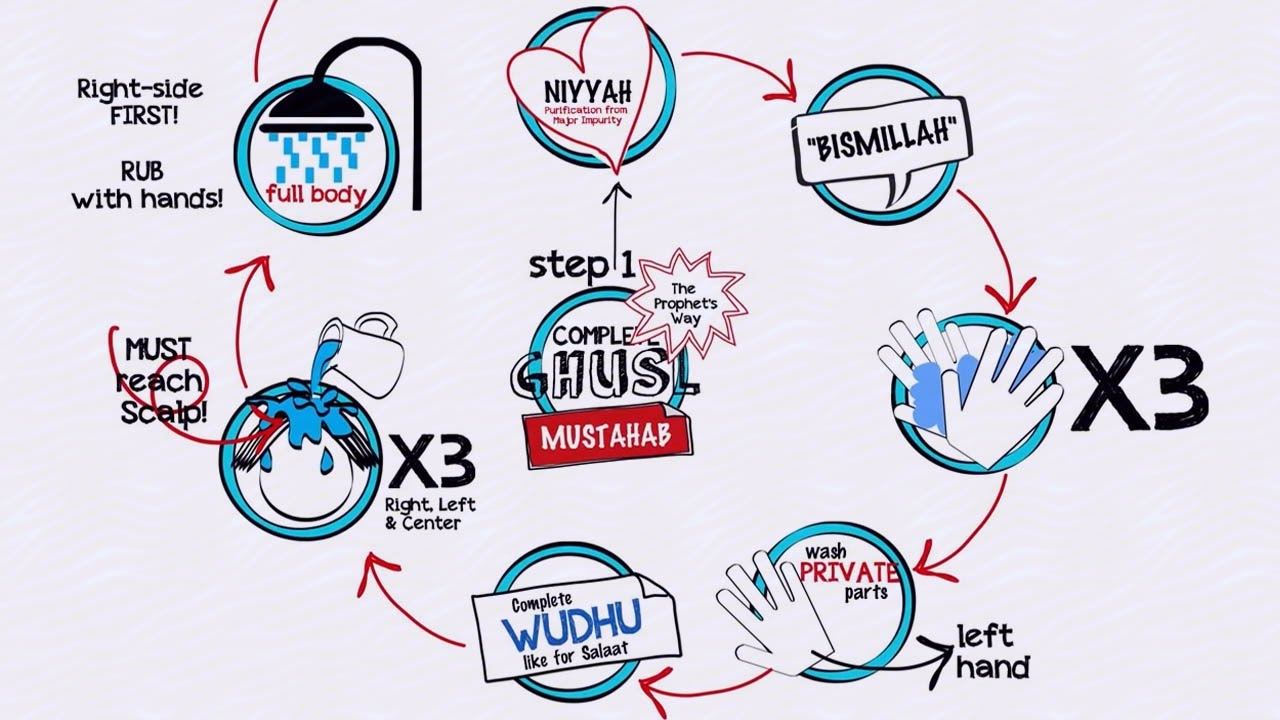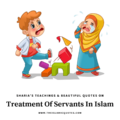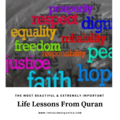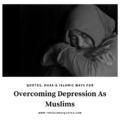Table of Contents Show
Hadiths on Health and Hygiene. Islam emphasizes on each and every aspect of life. Whether it is marriage, daily life activities or health and hygiene, Prophet (P.B.U.H) has elaborated the Muslim lifestyle clearly. The main focus of our Prophet (P.B.U.H) was on personal hygiene and health.
Not only him (P.B.U.H) but Allah (S.W.T) and his angels highlighted the importance of hygiene as well. Cleanliness and maintenance of hygiene are really important in Islam. Here are the hadiths on health and hygiene which will give you a broader perspective on cleanliness, hygiene, health and their importance.
The Prophet’s Sayings On Cleanliness and Health
Here are a few reasons why maintaining our hygiene is so important. Have a look.
- Keeping yourself and your environment clean keeps you fit and healthy.
- You’ll stay safe from diseases and infections.
- Allah (S.A.W.) loves the person who stays clean and maintains his hygiene.
- Angels send their blessings in the home where cleanliness and hygiene are maintained.
- A clean home environment increases the aesthetics of your living place.
We have already discussed some of the many benefits of cleanliness. Now let’s move on to the hadith on cleanliness and hygiene.
↓ 15 – Benefits of Using Miswak Daily:
Using miswak every now and then is highly recommended in both, Sunnah and Hadith. Prophet’s wife Ai’sha reported that the Prophet said, “the miswak (a twig from the tree) cleanses and purifies the mouth and pleases the God”.
Moreover, according to Abu Huraira; “Were it not that I might overburden my followers, I would have commanded them to use the miswak before every prayer.” This hadith is stated in Al-Bukhari and Al-Muslim which is known to quote the genuine Hadith as narrated by the Prophet (PBUH).
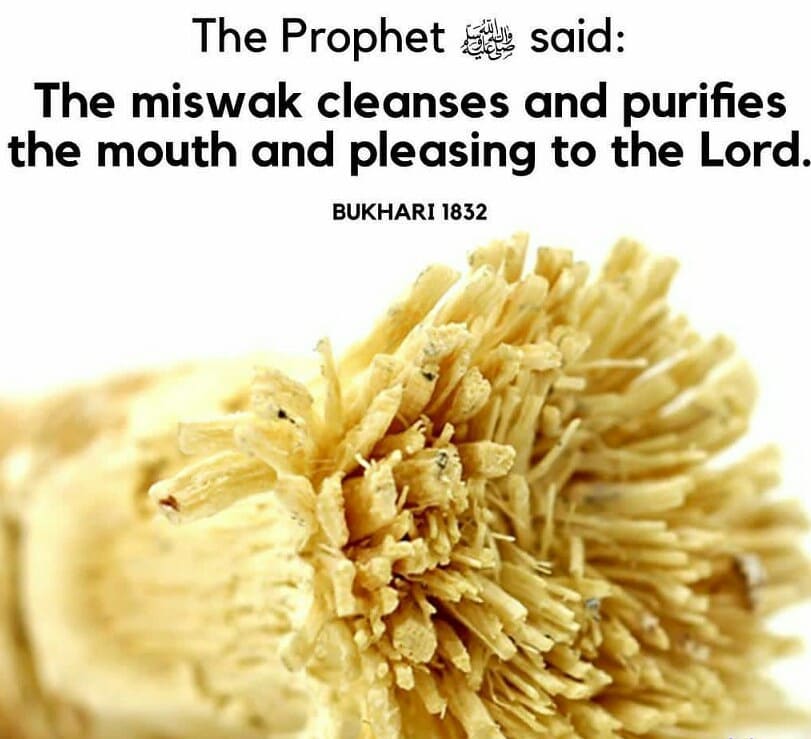
Via
↓ 14 – Cutting Nails
According to Abu Hurayrah, the Prophet (PBUH) would cut his nails every Friday before heading for the Jummah prayer. The Prophet has instructed us to cut our nails after a maximum of 40 days.
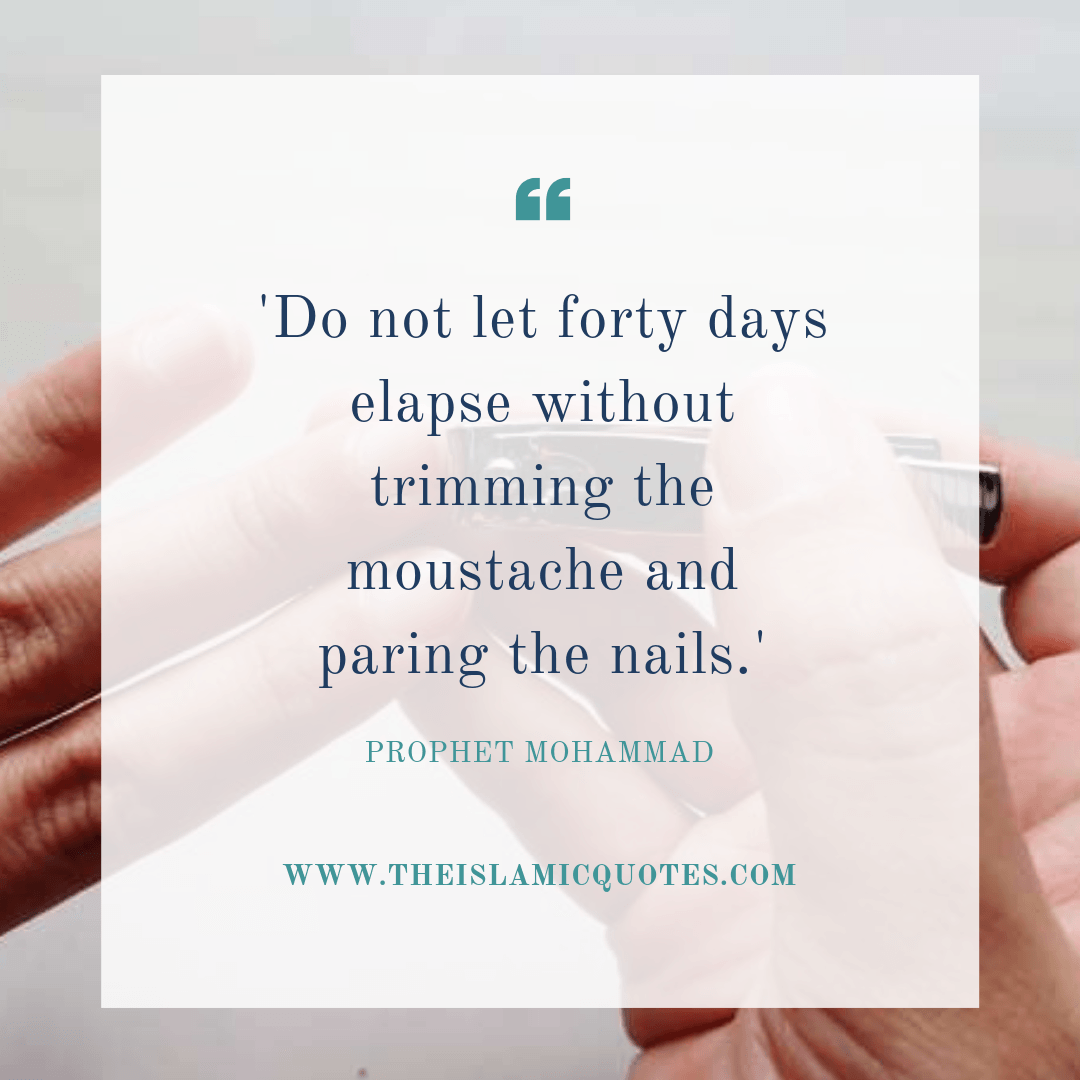
↓ 13 – Exercise & Sports
Many sports like archery and horse riding are encouraged in Islam. The Prophet’s walking style was what in the modern world would be called as “power walking” as his companions have reported that he was a very fast walker and he would advise others to do the same too to stay healthy. According to the hadith shared below, a physically strong Muslim is dearer to Allah as when a Muslim is active and energetic, he/she will be able to perform all his religious and worldly responsibilities in a much better way.

↓ 12 – Fasting To maintain Health
Intermittent fasting and its benefits on human health have been gaining immense popularity in recent years. However, this is something that has been practised by the Prophet and his followers for centuries. The Prophet himself would fast every Monday and Thursday and also on 13th to 15th of every month. Even when he wasn’t fasting, his eating routine is pretty much similar to what we call intermittent fasting as he would mostly only consume food once a day. And while his diet was simple, it was full of nutritious food items like dates, watermelon, milk and olive oil.
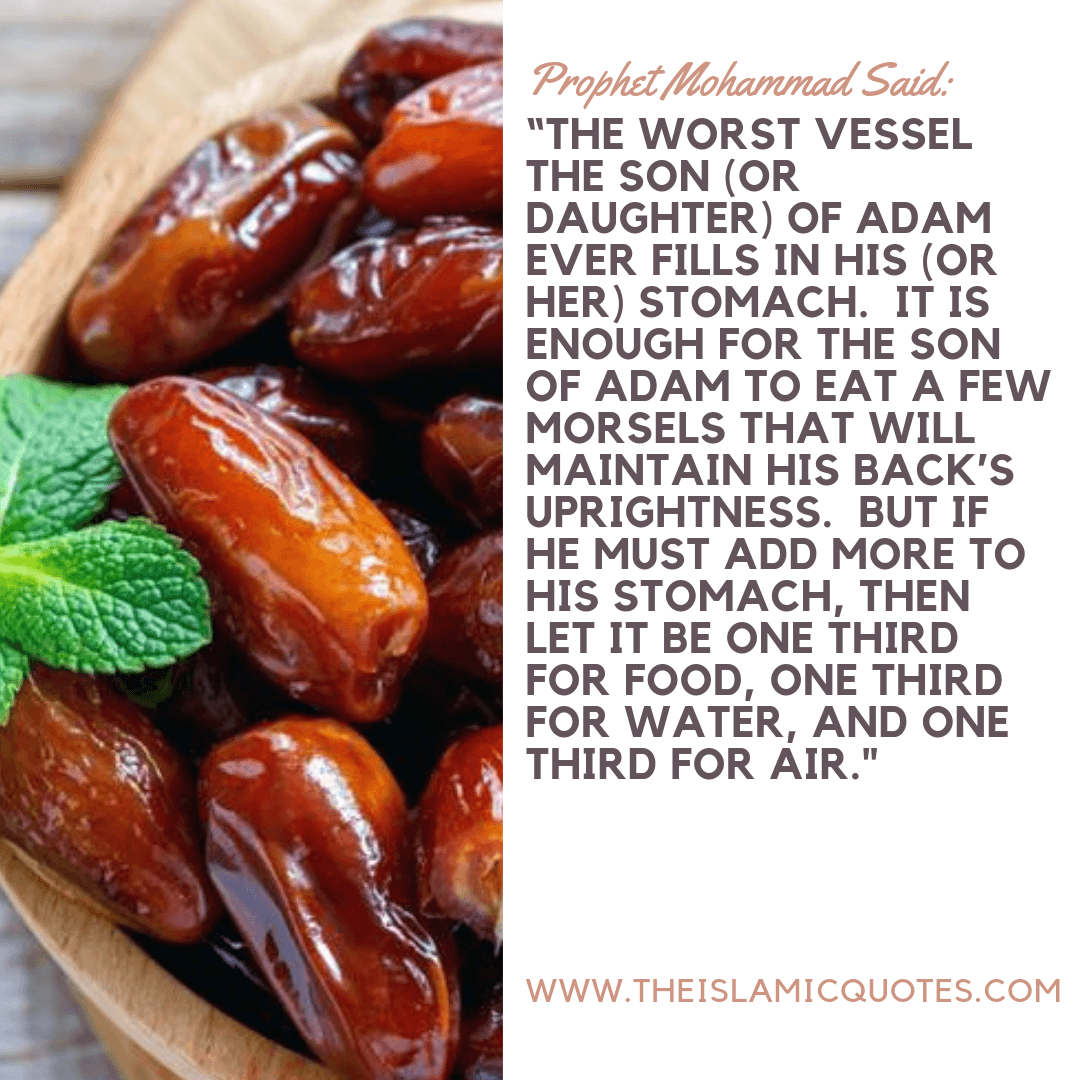
↓ 11 – Drinking Water The Right Way
The infographic shared below shows the right way of drinking water for Muslims, based on the ahadith and Sunnah of our beloved Prophet Mohammad. Many of these ways are now supported by science too, for example, the Prophet always adviced to drink water slowly and not science too says that drinking too much water at one time can cause electrolyte imbalance in the body which may lead to fatigue or dizziness.
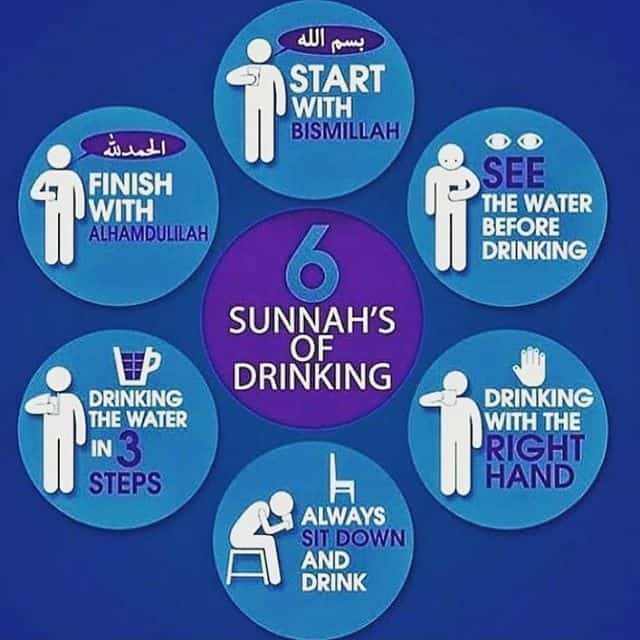
↓ 10 – Get Enough Sleep
The Prophet never advocated that Muslims should forget their sleep in their efforts to please Allah. He has given several guidelines on good sleeping practices. For example, he advocated turning the lights off before sleeping and the latest research shows that sleeping in complete darkness is important to maintain the body’s hormonal balance. We share below some of the most beautiful hadith on the importance of sleep below:
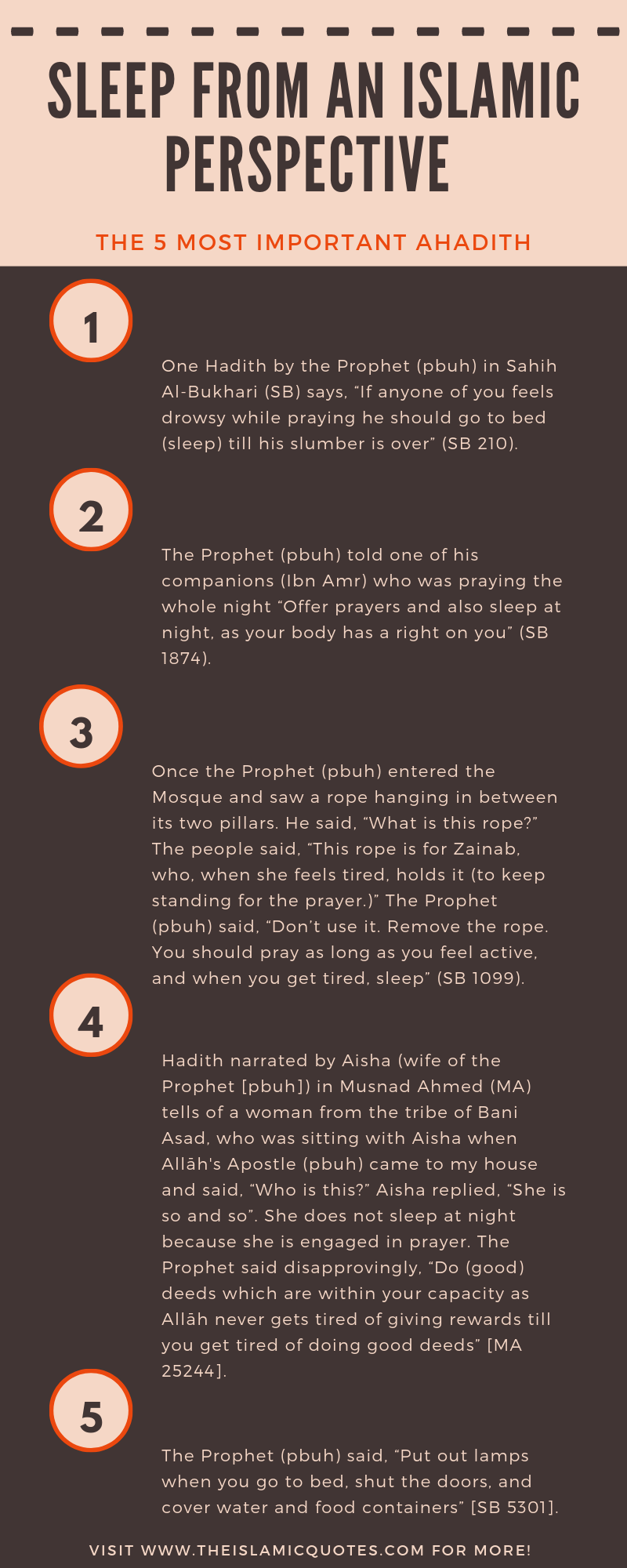
↓ 9 – Maintaining Personal Hygiene:
Prophet (PBUH) suggested maintaining personal hygiene in numerous Hadith. Not only Prophet (SAW), Allah (SWT) has also advised the Muslim Ummah to take care of one’s personal hygiene.
According to a Hadith narrated by Abu Huraira (mentioned in Sahih Muslim and Sahih Bukhari);
“Five practices are of the fitrah (natural disposition): circumcision, shaving the pubic region, clipping the nails and cutting the moustaches short.”
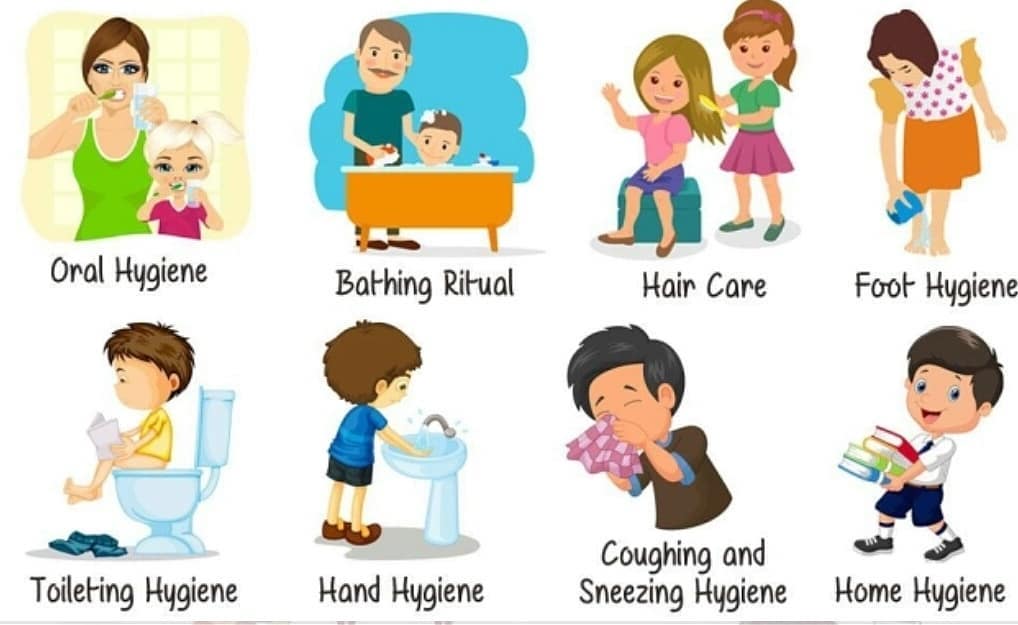
Via
↓ 8 – Wash your Hands:
Prophet (PBUH) emphasized on washing hands a lot. Before eating, after finishing the meal, before sleeping, after waking up, in short, after every task, our Prophet (PBUH) recommended his ummah to wash hands, regularly.
Abu Huraira narrated;
When one of you awakens from sleep, do not let him dip his hands into the vessel until he washes them three times. Verily, he does not know where his hand spent the night.”
This clearly indicates that the Prophet (PBUH) focused on washing hands the most.
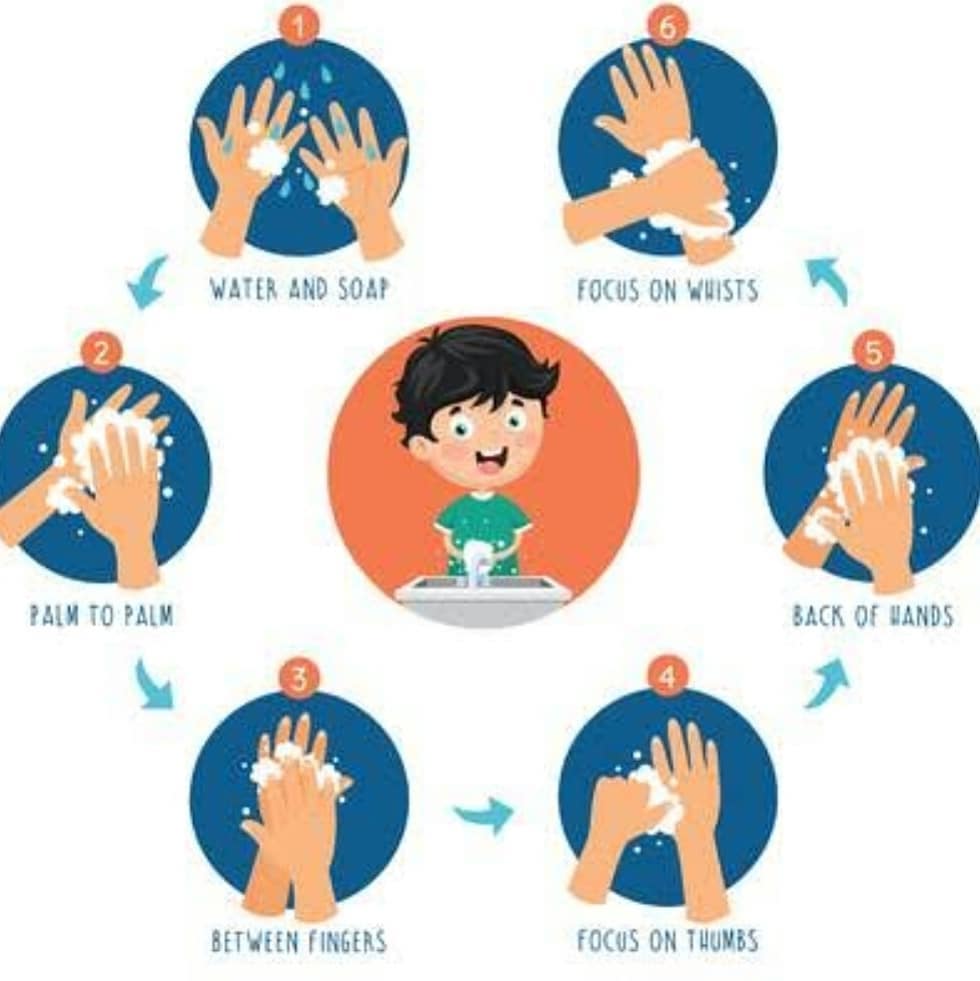
Via
↓ 7 – Keep your Environment Clean:
Prophet Muhammad (PBUH) not only advised to keep our body clean but also recommended us to keep our surroundings and environment clean.
Mu’adh reported that our Prophet (SAW) notified that;
“Beware of the three acts that cause you to be cursed: relieving yourselves in shaded places (that people utilize), in a walkway or in a watering place.”
Moreover, he also focused that cleaning the path for others and keeping your roads clean is an act of charity.
Abu Dharr Al-Ghafari narrated that;
“Removing harmful things from the road is an act of charity (sadaqah).”
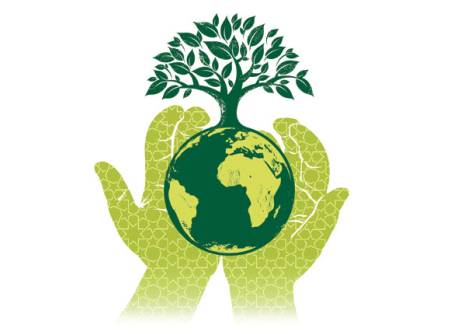
Via
↓ 6 – Washing After Defecation
The Prophet had strongly advised Muslims to wash after urination or defecation, also known as istinja. This is now supported and recommended by modern researchers too as not washing or just using toilet paper can lead to spreading of germs like E.coli.
The evidence for that is the hadeeth of Anas (may Allaah be pleased with him) who said: “The Prophet (peace and blessings of Allaah be upon him) used to relieve himself, then another boy and I would bring a vessel of water and a short spear [to use as a sutrah for the prayer he was going to do after doing wudoo’] and he would cleanse himself with the water.”
(Narrated by al-Bukhari, 149; Muslim, 271)
↓ 5 – Avoid Over-eating
Our Prophet (PBUH) greatly encouraged us to keep our diet healthy and organic. According to the hadith, “No man fills a container worse than his stomach”.
Another hadith regarding eating authenticated by Al-Albani mentioned in At-Tirmidhi is;
A few morsels that keep his back upright are sufficient for him. If he has to, then he should keep one-third for food, one-third for drink and one-third for his breathing”.
Another hadith says:
“Don’t indulge in over-eating because it would quench the light of faith within your hearts” [7]
These hadiths clearly indicate how overeating can lead to various health issues like high blood pressure, sugar, obesity and numerous other heart diseases. Therefore it is necessary to follow our Prophet’s sunnah and lead a healthier life.
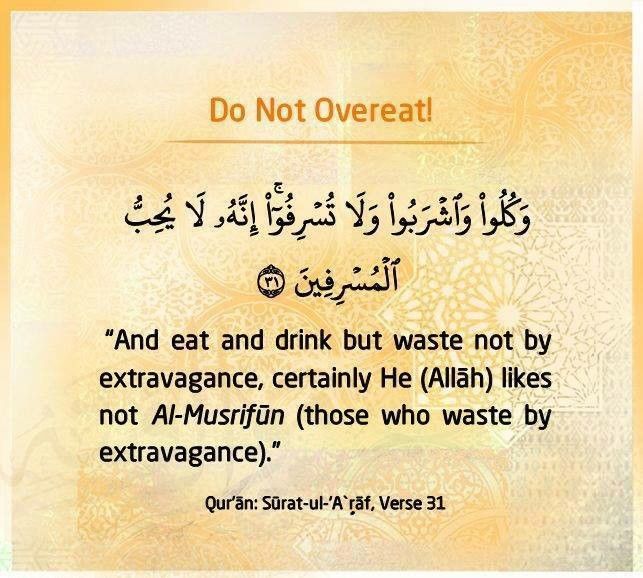
Via
↓ 4 – Take Medicine when Needed
Muhammad (SAW) also encouraged the use of medical treatment and medicines. As narrated by Abu Hurraira;
I came to Muhammad (SAW), he and his companions were sitting when a few Arab from a nearby village came and asked; O Messengerr of Allah, should we use the medicines and make use of the medical treatment?
To this question, our Prophet (SAW) replied;
“Make use of medical treatment, for Allah has not made a disease without appointing a remedy for it, with the exception of one disease, namely old age.”
This hadith is authenticated by Al-Albani, which clearly indicates that our Prophet (SAW) has encouraged us to use the medicines for the cure of the diseases and disorders.
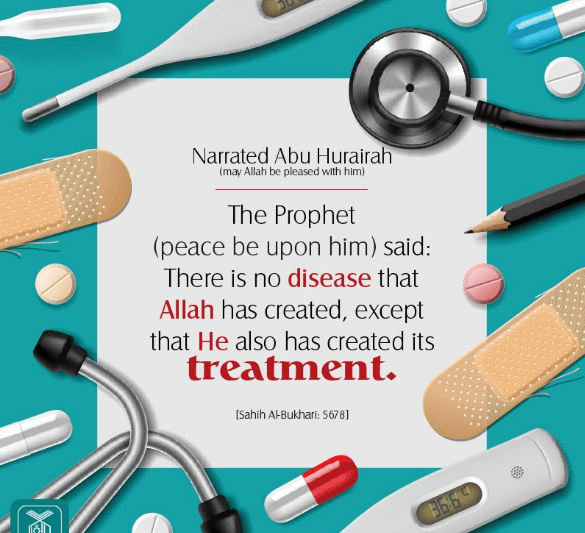
↓ 3 – Maintain Cleanliness
Prophet (PBUH) said, “cleanliness is half of faith (Imaan)”. This hadith is mentioned in Sahih Muslim, which is a Kuttab-ul-Sittah in Sunni Islam. One of the most prominent hadiths mentioned in the book is related to hygiene and health. Our Prophet (PBUH) greatly emphasized on the maintenance of health and hygiene and according to the hadith, it is considered as half of a Muslim’s Imaan.
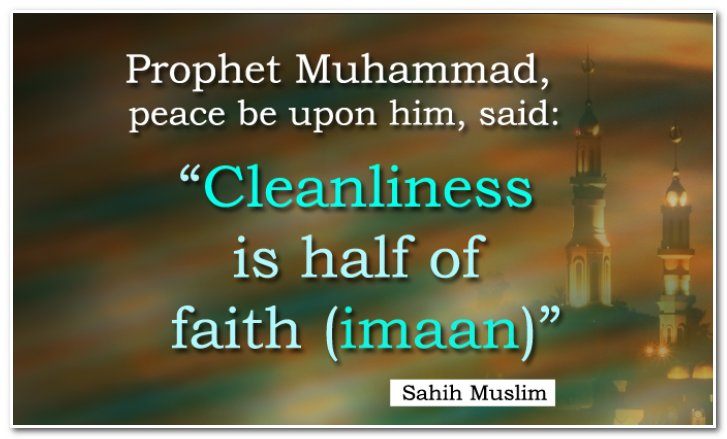
Allah (SWT) and his Prophet Muhammad (SAW) has guided us to keep clean in order to increase our sustenance. There are a number of hadiths and Sunnah which clarify that keeping clean is the key to enter Paradise. Hadith about cleanliness:
“Islam is clean. Therefore, you should keep yourselves clean, too. Only the clean people can enter Paradise.”
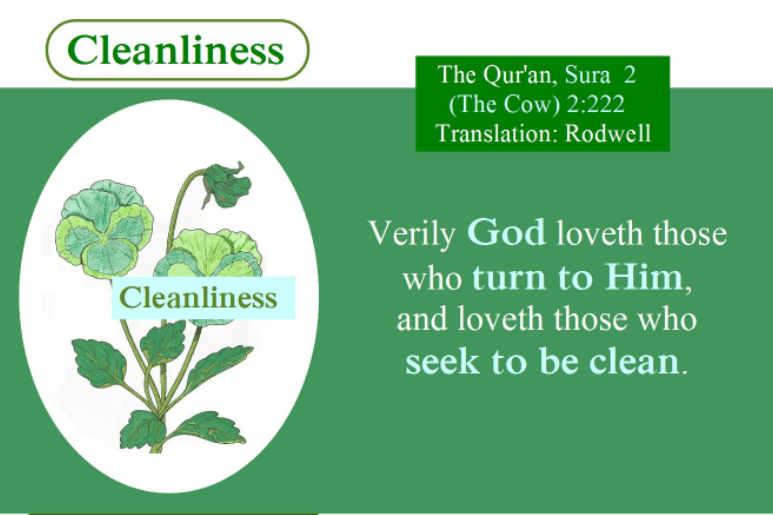
Via
↓ 2 – Focus on Mental Health
Our Prophet (PBUH) advised us to focus on our mental health as well as physical health. Keeping a peaceful mind and accepting life changes can greatly help in maintaining our mental health.
A man once asked Prophet (PBUH), “give me advise”, upon which the Prophet (PBUH) said, “do not become angry and furious”. The man repeatedly asked the same question and the Prophet (PBUH) repeated the same answer. Prophet (SAW) said if the person controls his anger he can easily control everything else; anxiety, depression, tension and stress.
According to an authentic narration, “The powerful man is not the one who can wrestle, but the powerful man is the one who can control himself at the time of anger.” Controlling anger can relax your mind which reduces the chances of strokes and other fatal illnesses.

Via
↓ 1 – Bathing and Purification
Abu Dharr narrated that;
“Whoever takes a bath on a Friday and does it well, and purifies himself and does it well, and puts on his best clothes, and puts on whatever Allah decrees for him of the perfume of his family, then comes to the mosque and does not engage in idle talk or separate (pushing between) two people;he will be forgiven for (his sins) between that day and the previous Friday.”
Therefore, our Prophet focused greatly on cleanliness and encouraged Muslims to stay healthy by following the teachings of Islam. Ghusal is also a part of Muslim purification which should be performed by the Muslims to keep themselves clean.
